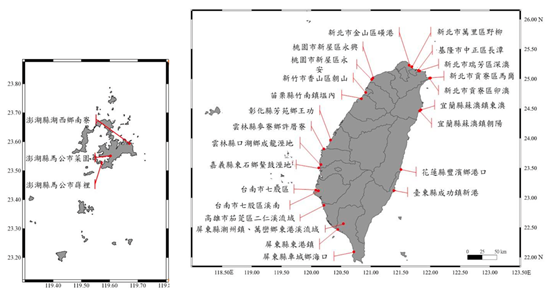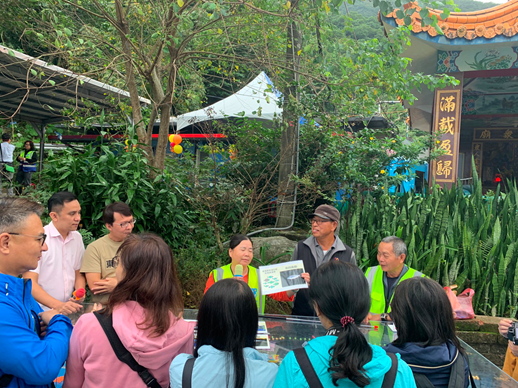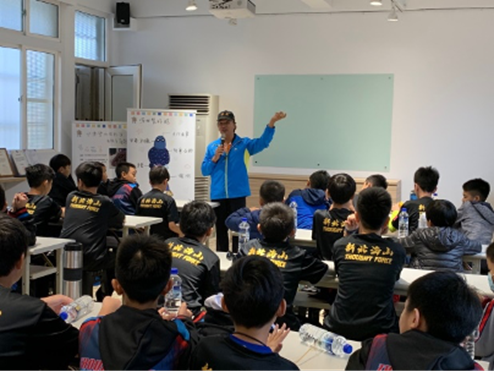People’s livelihoods along the coastlines rely on fishery resources, which are affected by coastal, environmental, social and economic changes, as well as resource reduction. At present, coastal fishing villages are facing the dilemma of sustainable development. The Fisheries Research Institute of the Council of Agricultural has followed relevant policies in recent years to gradually promote the Satoumi Project for the transformation of fishing villages. The researchers have conducted field visits in Mao'ao (New Taipei City), Dong'ao (Yilan County), Caiyuan (Penghu County), and other communities since 2019. They have helped residents develop local and ecological recognition to independently invest in satoumi practices, as well as preserve and utilize coastal ecosystems to enhance the resilience of fishing villages.
The Fisheries Research Institute has pointed out that satoyama and satoumi are natural conservation methods valued by the United Nations and the Convention on Biological Diversity. The project goal is to realize the harmonious coexistence of human society and nature, with an emphasis on the preservation, utilization and conservation of the overall ecosystem and landscapes of the forests, mountains, villages and seas. In the context of the development of satoyama and satoumi, the Council of Agriculture has begun to deliberate over the vision and practice of the harmonious coexistence of mankind and nature. However, as the resource inventory and guidance for coastal fishing villages were insufficient in the past, an important part of the overall development of the forests, mountains, villages and seas has gradually been laid out since the incorporation of the Fisheries Research Institute.
The Fisheries Research Institute, National Taiwan Ocean University, and National Cheng Kung University have joined hands to gradually inspect 28 fishing villages across Taiwan since 2019, and have found that many coastal fishing villages already have the basic conditions of satoumi. The Taiwanese version of the Satoumi Promotion Indexes has been developed through the collection of literature data and professional opinions to serve as a guideline for the subsequent development of satoumi in Taiwan. In 2020, in addition to the continued investigation and research of three satoumi fields, including Mao'ao (New Taipei City), Dong'ao (Yilan County), and Caiyuan (Penghu County), the research team held four focus group symposiums to discuss topics and provide a consensus. Later, external resources such as the Taiwan Association for Marine Environmental Education and a social enterprise platform to promote large events in small communities were introduced. From March 11 to November 30, 2020, tutoring and training were offered to the local residents, during which seven satoumi environmental education and three fishery citizen science courses were arranged, and lesson plans were prepared as reference cases for promoting satoumi education in other fields in the future. The aims were to strengthen residents' awareness of and consensus on the environment and to reconnect the relationship between residents and the ocean.
In order to realize the sustainable coexistence of the residents' lives, economic activities and the natural environment in coastal fishing villages, the Fisheries Research Institute has suggested that it is necessary to establish a diverse and inclusive communication model at the local level as soon as possible, so that stakeholders can recognize the value of local traditions and culture. Therefore, promoting the participation of more diversified stakeholders and the maintenance of partnerships are basic skills in the construction of the satoumi field and an important soft project under the sustainable development of the land. The research team presented the Dong’ao Industrial Achievement Event on October 24, 2020, in which local residents, fishermen, leisure businesses, schools and other stakeholders participated in cleaning up the port and beach, held a bamboo raft launching ceremony, fixed nets, introduced fish species, told fishing village stories, and held a fish grabbing (bidding) and other activities. As seen from the experience of the Dong’ao community, local awareness and organizational energy have gradually formed, and the number of participants in local fishing village culture and ecological services has increased. In the future, industry in Dong’ao can be gradually developed through the real estate and local consumption business model.
The Fisheries Research Institute states that a set of feasible rules of thumb has been gradually developed through the accumulated experience of working in the three current satoumi fields, which can be used as the basis for the expansion of satoumi across the country in the future. However, satoumi transformation requires considerable investments in manpower, materials and resources, and this long and arduous project has become an important task for assisting residents to independently move towards the sustainability of fishing villages.
Marine Fisheries Division, Fisheries Research Institute, Council of Agriculture


Figure 2. Dong'ao promoted the practice of the satoumi spirit, and residents began to explain traditional culture and set up fishery and ecological environments independently.

Figure 3. Mao’ao local community reception services combined with satoumi environmental education to drive a new industrial development model.